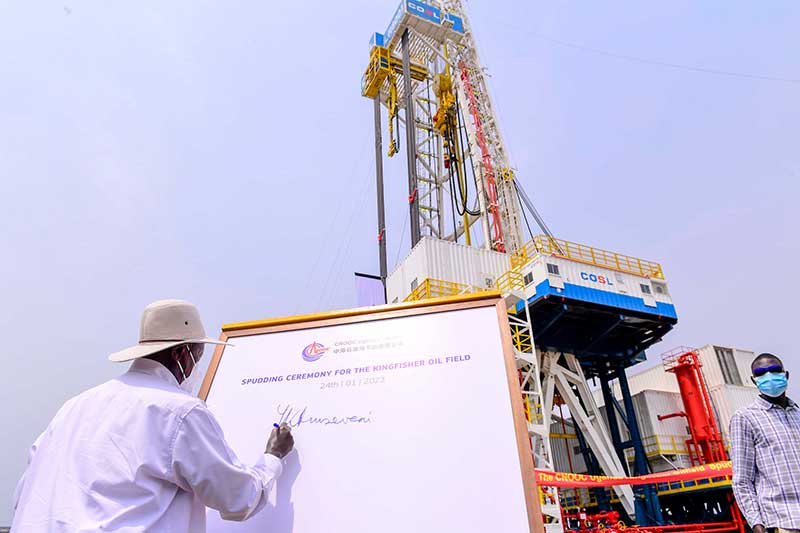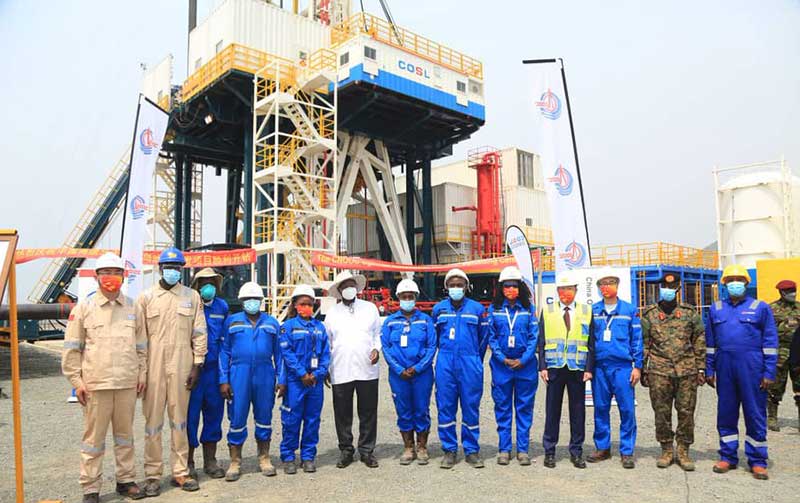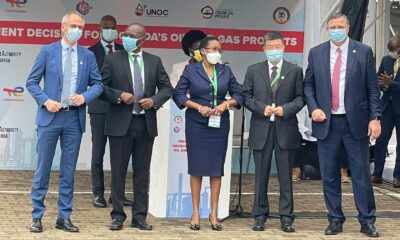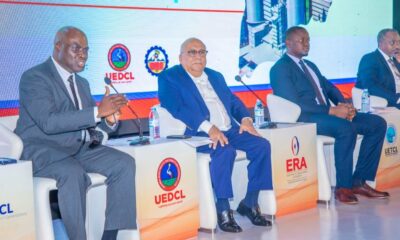Business
Uganda enters most critical phase of oil dev’t, as billions of Shillings get unlocked

President Yoweri Museveni launched the first oil rig to be used to create oil wells in Uganda’s Albertine graben region
President Yoweri Museveni on January 5, 2023 commissioned the first oil rig – a sophisticated structure that facilitates the sinking of pipes that are used to extract oil from deep underneath the ground and bring it onto the surface before it can be transported to the markets.
During the highly publicized ceremony held at Buhuka in Kikuube district, Museveni described the event as a milestone that takes Uganda closer to the highly anticipated reality of oil production by 2025.
Museveni commissioned the oil rig at one of the Kingfisher wells that is operated by Uganda’s partner CNOOC Uganda.
CNOOC plans to use the commissioned rig to drill some of the 31 wells from which oil will be extracted once production kicks off. The president said Uganda will continue to develop its oil and gas resources alongside other sources of energy.
“We shall develop our oil resource but also develop solar energy. Solar energy is our ancient energy here for Africans…We’re going to use the solar power, the wind power, the hydropower but also the oil as we develop the others,” said Museveni.
The president used the occasion to allay fears that the oil being developed by Uganda may not be marketable given the debate to shift from fossil fuels to cleaner energy options.
“And even when the others are fully developed, still petroleum is needed for other products not necessarily for fuel. The shirt I’m putting on has got some polyester in it and polyester is from petrol. We need some tan to make kolasi (tarmac) to make roads, we need the fertilizers, nitrogen from ammonium – all these are from petroleum. So we can use the petroleum responsibly. The other ones cause problems for the world in global warming because of greed. They are greedy for money, they don’t think about anything else, they are the ones who cause the world those problems,” added Museveni.
He also pledged to use the oil resources for the benefit of Ugandans and not plunder it like most Africa oil producing countries.
Uganda is estimated to have about 6.5 billion barrels of crude oil, although only 1.4 billion barrels of that are recoverable.
The commissioning of the drilling rig for the Kingfisher Development Project (KDF) triggered mixed reactions of excitement and skepticism among Ugandans, with some noting perhaps that oil may soon be out of the ground.
But the executive director of the Petroleum Authority of Uganda (PAU), Eng. Earnest Rubondo explained that in order to produce the volumes that are expected from the Kingfisher and Tilenga projects, drillings of the wells for production has to be done in advance. “Those volumes require production from many wells. So you need to start drilling these wells early, so that when the day of production reaches, you begin to have production from the different wells.”
According to Rubondo, the drilling that has been commissioned is for the first production well that will produce oil in the Kingfisher field. Construction of the Kingfisher project is being undertaken by a joint venture of China Offshore Oil Engineering Company and China Petroleum and Construction Corporation.
Facts about Uganda’s oil development
- The newly commissioned rig will be used to drill up to 31 wells in the Kingfisher field, 344 square kilometer area in the Lake Albert Rift Basin in western Uganda.
- The deepest well is believed to lie some seven kilometres beneath the earth’s surface.
- Eight wells are expected to be drilled before production of first oil in 2025.
- The oil field is expected to have a maximum production of 40,000 barrels of oil per day for five years, after which production will begin to decline,” Mr Rubondo said.
- The Kingfisher oilfield development is expected to cost over US$2 billion over the next three years, until shortly after production starts and over US$1.5 billion over the remaining 20 years of the life of the oil field.
- This means that the next three years of oil field development are the most critical for businesses and the country because this is the period during which the largest amount of work, travel and logistics shall be needed.
- During this period, the oil company will require a constant supply of different skills ranging from a few but highly paid oil rig specialists, providers of catering services, drivers of trucks to take away waste material dug from under the ground, and provision of environmental services to ensure safe disposal of the waste.
- State minister for Minerals Peter Lokeris told a news conference this week that since the unveiling of the Final Investment decision in February 2022, Total and CNOOC (U) Ltd have signed contracts with US$6.8 billion with service providers, of which an estimated US$1.73bn (25%) has been awarded to Ugandan companies.
- All service providers are registered on the National Suppliers Database overseen by the Petroleum Authority of Uganda (PAU) databank.
- Some 160,000 Ugandans are expected to be employed in the oil activities at the peak of the development process.
- There are three major oil development activities taking place in the country.
- The Kingfisher project, the Tilenga development project and the East African Crude Oil Pipeline (EACOP) project.
- According to Minister Lokeris, the EACOP will affect 3648 people, of which 2662 have already signed compensation agreements with the company and 1977 of them have already received their money.
Comments



























